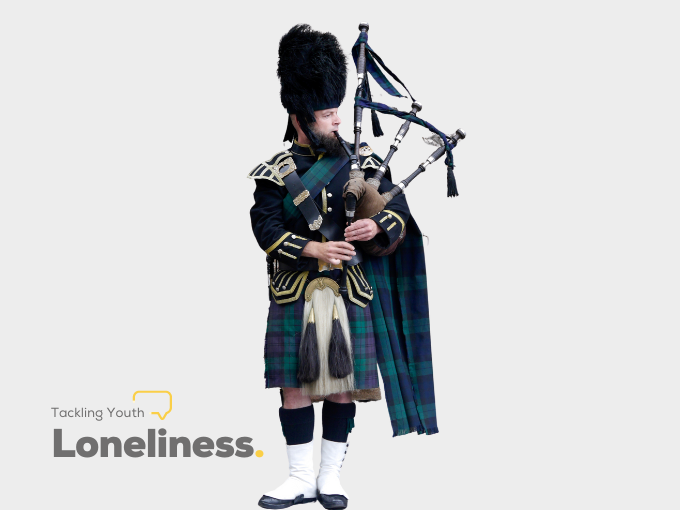I moved to Scotland on Saturday, 12 February 2022. The day was incredibly emotional for me; it is honest to say that I will never forget it. The whole process of moving here felt like a blur. From the moment when I first heard of the news, till the point when I sat in a plane flying to the UK, I was in a constant state of denial. Leaving my whole life behind me was not easy. I grew up in Lahore, Pakistan, a place which has a culture and traditions vastly different from Scotland. Everyone I had ever known was from there my family, relatives, friends and teachers. The leap from a country of an entirely different environment to that of sudden freedom was a lot.

I was nervous for many reasons. I did not know much about Scotland, which is why I was clueless about how to fit in. I had heard that the people had a different accent, bagpipes were common here, kilts were worn by many, and it was a country of harsh cold. Many scientists emerged from here letting me know that it was a country which respected its professionals. I also knew that it was a white-dominated region, which is why I feared that as a brown girl from a Muslim country, I could very easily be the target of racism, islamophobia and sexism. All these fears were a constant agony, which made me feel lost and dissociated. When I started school in March, I was reluctant towards talking to new people, even though everyone was incredibly friendly. I did not want to be the victim of bullying for being myself.
Eventually, I did start making new friends. This, however, did not put an end to my feelings of dissociation and loneliness. It was a struggle trying to befriend all these new people. I never had to make friends before, because I had never experienced such a huge change. I had never even changed schools, I had constant people with me throughout nursery, primary school, and high school. Being in a different country and not having enough company was a challenge. It was the inability to fit in.
Some other factors also contributed to my glum emotions. The people I was friends with had lived different lives. They talked, very often, with references to their childhoods: snacks they had enjoyed, cartoons they had liked, places they had visited on holiday.
I grew up with entirely different food, watched cartoons which were mainly American, and went on holiday in the provinces of my own country places my new friends had never heard of.
They communicated often with terms of Scottish slang, and I was unable to understand. I had to ask what they meant, often making me feel like a bother to everyone. My self-esteem was damaged. I did not feel ‘good enough’ for this new environment. I was constantly trying to fit in, but failing. Another reason why I felt lonely was because I realised that changing myself to a new environment was not the best decision. I did not want to change myself and my character for the sake of being a part of a new place. I was in a state of dilemma, and finally, wishing to conserve my originality and essence, I chose to make a sacrifice by prioritising myself over the constant urge of being like my friends.
Loneliness follows me everywhere, but what I find most important is that I must give maximum importance to my personal health and identity before I change who I am for others.
The right people will always be there for me and will care for me no matter what. I realised that what helped me deal with these overwhelming negative emotions was writing whether in the form of essays, short stories or poetry. I put my experiences and emotions into words, and revisiting them made me realise how important it is for me to acknowledge these emotions. The emotions I go through are real, and I must not bury them because they may seem unimportant.
Talking to the people I trust also helped me, as it made me realise that wanting to cut myself off from others’ lives was a rash decision and that I must have the courage to talk to them more openly instead of burying my emotions. In addition to this, focusing on my school work, and making sure that it was my very best output, also helped me feel better about myself. Working on neat detailed notes, or handing in homework with my best handwriting made me value myself more. I felt less awful, my self-confidence improved and my feelings of loneliness started vapourising.
More information
Check out more blogs and content created by young people on the issues that matter most to them and submit your own blog pitch on our Youth Voice page.
If you’re interested in volunteering, visit the #YSHive page to see what volunteer opportunities are available with Young Scot.
For more information about supporting your mental health and emotional wellbeing visit our AyeFeel page.
Young Scot supports young people to share their own voices, views and opinions and works with partner organisations and professionals who are experts in different topics. The views expressed in this blog are those of the young people, organisations and/or individuals who have taken part in the blog, not necessarily the views of Young Scot.
Young Scot supports young people to share their own voices, views and opinions and works with partner organisations and professionals who are experts in different topics. The views expressed in this blog are those of the young people, organisations and/or individuals who have taken part in the blog, not necessarily the views of Young Scot.
